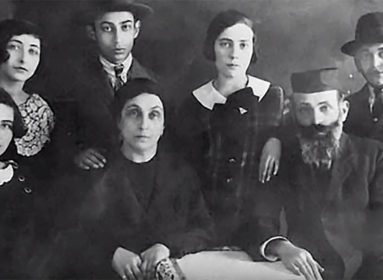
Tzipi Hotovely’s comments highlight underbelly of mistrust between american Jews and Israel
By Alex Traiman/JNS.org

Israeli Deputy Foreign Minister Tzipi Hotovely speaks at the Knesset on March 28, 2016. Credit: Yonatan Sindel/Flash90.
Controversial remarks made last week by Israeli Deputy Foreign Minister Tzipi Hotovely—that American Jewry is out of touch with the daily realities of life in Israel—have exacerbated a growing rift between U.S. Jews and Israel on key social, religious and political issues, as well as on continued philanthropy to the Jewish state.
The comments themselves, as well as subsequent criticism and condemnation by both American Jewish leaders and Israeli politicians, seemingly demonstrate that a climate of mistrust has been building up between the world’s two largest Jewish communities.
Shmuel Sandler, a professor of religion and politics at Israel’s Bar-Ilan University and a senior research associate at the Begin-Sadat Center for Strategic Studies, said Hotovely was “reacting to a growing feeling between both sides, American Jewry and Israeli Jewry, that there is ‘trouble in the tribe’—especially between the liberal wing of American Jewry which is mostly secular, and the Israeli government which is more conservative and has a strong Orthodox religious element.”
“There is a growing rift between the two communities, and it should be overcome,” Sandler told JNS.org.
Hotovely was castigated for saying that American Jewry “is not understanding the complexity of the region,” adding that Israel is not understood properly by American Jews because they “never send their children to fight for their country, most of the Jews don’t have children serving as soldiers, going to the Marines, going to Afghanistan, or to Iraq. Most of them are having quite convenient lives. They don’t feel how it feels to be attacked by rockets, and I think part of it is to actually experience what Israel is dealing with on a daily basis.”
Prime Minister Benjamin Netanyahu, amid calls to dismiss Hotovely from his government, said diaspora Jews “are dear to us and are an inseparable part of our people. There is no room for such an attack, and its words do not reflect the position of the State of Israel.”
American Jewry’s financial support for Israel
Since Israel’s founding as a fledgling, resource-poor state in the usually hostile Middle East, American Jews have contributed billions if not trillions of dollars to the Jewish state. Such donations have borne fruit, with Israel’s Jewish population skyrocketing to more than 6 million Jews—approximately the same size as America’s Jewish community—and the nation developing into an economic power.
Many American Jewish philanthropists feel that the funds they give toward Israel also come with the right to openly voice their opinions on the merits of Israeli policies.
Earlier this year, when the Israeli government refused to change the access point to an egalitarian prayer section at the Western Wall plaza, opponents of the government’s decision appealed to Jewish philanthropists to cut off donations to Israel—rhetoric akin to anti-Israel activists’ calls for boycotts of the Jewish state.
Israeli President Reuven Rivlin, who himself had been criticized for saying more than 30 years ago that Reform Judaism is “idol worship and not Judaism,” said of Hotovely’s remarks, “The [U.S. Jewish] community longs for a connection with Israel, but wants a relationship between equals, not of philanthropy on the one hand and blind admiration on the other. We must embark on a new path, no longer a relationship of charity, but a shared commitment to justice, to Jewish and human mutual responsibility. No longer with the silencing of mutual criticism, but with courageous and sincere openness.”
During the past several years, heads of major Jewish communal organizations in the U.S. have openly criticized Israeli policies towards Palestinians as well as settlement construction, under the mantra that one can support Israel and criticize it at the same time. Israelis have recently begun returning criticism toward the American Jewish community over substandard Jewish education, high assimilation and intermarriage rates, and disconnection from Israel.
“I think [Hotovely] made a mistake,” Sandler said. “She echoed some real problems, but did not use the right words.
I think that she should not have made those comments on television. If you want to make those comments, you do that from within, and not externally for everyone to hear.
And in Israel, we would expect American Jewry to do the same.”
Polarizing political climate

In June 2017, Prime Minister Benjamin Netanyahu addresses a joint Knesset-Congress event for the 50th anniversary of Jerusalem’s reunification. Credit: Amos Ben-Gershom/GPO.
Since Israel’s founding, support for the Jewish state in America’s political landscape has been considered a bipartisan issue. Yet during the presidencies of Barack Obama and now Donald Trump, support for Israel has increasingly fallen along party lines.
An April 2017 survey conducted by University of Maryland researchers found that 66 percent of Republicans and just 15 percent of Democrats nationwide believe the Trump administration’s policy should “lean toward Israel.” A January 2017 Pew Research Center poll found that 74 percent of Republicans sympathize more with Israel than with the Palestinians, but only 33 percent of Democrats share that sentiment.
At the same time, Netanyahu, who had an openly contentious relationship with Obama, portends to have a close relationship to Trump. This runs counter to the voting patterns of American Jews, who historically support Democratic presidential candidates over Republicans. Trump garnered 24 percent of Jewish votes in the 2016 election, compared to 78 and 69 percent for Obama in the 2012 and 2008 races, respectively.
Mitchell Barak, an Israel-based political consultant and director of the Keevoon Research survey and strategic communications firm, told JNS.org that Netanyahu “has condemned the statements of Hotovely, but his actions, specifically on delaying the Kotel (Western Wall plaza) equal access, the conversion issue, the silencing of any questioning or dissent of Israeli policies in the territories or vis-a-vis the Palestinians, and his partisan embrace of Trump, which was preceded by his demonizing of President Obama, has split the community because Israel has become a partisan issue.”
Israel “is losing American Jews’ bedrock of support,” Barak said.
“The Obama years were not good for the relationship,” echoed Sandler. “That is one of the processes that contributed to it. And now [there are] the differences between American liberal Jewry and President Trump, while Israel supports him.”
According to Sandler, other issues contributing to the divide between Israel and U.S. Jewry are “the problems between Orthodox versus Reform Jewry;” the rise of J Street, the left-wing lobby group that opposes many Israeli policies, during the Obama years; the BDS movement; and the fact that “today you have the fundamentalist Christians supporting a more hawkish Israeli policy than liberal American Jewry.”
Sandler believes that it will take a lot of work to alleviate the discord between the American Jewish community and Israel.
“I am afraid it will get worse,” he said. “There are a lot of undercurrent streams that have enlarged this issue.”








 Southern New England Jewish Ledger
Southern New England Jewish Ledger










